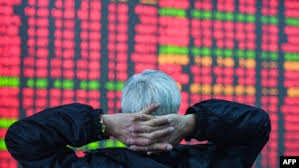TOKYO, Dec 31: Global market shares displayed a mixed performance on Tuesday, as trading remained closed in Tokyo and Seoul for the New Year holidays.
The CAC 40 in France gained nearly 0.1 percent, reaching 7,307.87, while Britain’s FTSE 100 showed little movement at 8,119.65. The German market was closed for New Year’s Eve and January 1, with trading expected to resume on Thursday.
Futures for the S&P 500 increased by 0.2 percent, and those for the Dow Jones Industrial Average rose by 0.1 percent.
In Sydney, Australia’s S&P/ASX 200 dropped 0.9 percent to 8,159.10.
Hong Kong’s Hang Seng index saw a slight increase of nearly 0.1 percent, reaching 20,059.95, while the Shanghai Composite Index fell by 1.6 percent to 3,351.76, following Chinese manufacturing data that suggested Beijing’s stimulus measures have not sufficiently invigorated the struggling economy.
According to the National Bureau of Statistics on Tuesday, China’s Purchasing Managers’ Index, derived from a survey of factory managers, decreased to 50.1 in December from 50.3 in the previous month. This marks the third consecutive month with a reading above 50, indicating an expansion in manufacturing activity.
Trading in Tokyo will resume on January 6, as markets will remain closed for the rest of the week due to New Year celebrations. South Korean markets will close for New Year’s Day and restart trading on Thursday.
U.S. markets will be closed on Wednesday.
On Monday, markets retreated, with the S&P 500 falling by 1.1 percent, the Dow dropping by 1 percent, and the Nasdaq composite closing down 1.2 percent.
Boeing’s stock faced a decline after one of its jets skidded off a runway in South Korea, resulting in the tragic deaths of 179 of the 181 individuals on board. South Korea is now inspecting all 737-800 aircraft operated by domestic airlines.
This incident adds to Boeing’s troubles, which have included a machinists’ strike, additional safety concerns with its flagship aircraft, and a significant drop in stock prices. This year alone, its shares have plummeted by over 30 percent.
As the year comes to a close, markets reflect a remarkable performance fueled by a robust economy, strong consumer spending, and a healthy jobs market. Investors have been encouraged by easing inflation levels throughout the year, which have neared the Federal Reserve’s target of 2 percent. This has raised hopes for a consistent series of interest rate cuts by the central bank, alleviating borrowing costs and promoting further economic growth.
The Federal Reserve implemented three interest rate cuts in 2024 but has indicated a more cautious stance moving into 2025 due to signs of rising inflation. The latest consumer price report revealed a slight increase in inflation to 2.7 percent in November.
Concerns over President-elect Donald Trump’s threats to impose higher tariffs have also heightened anxieties regarding the potential resurgence of inflation, as companies commonly transfer the increased costs from tariffs to consumers.
This week, investors lack significant corporate or economic updates to analyze, given the shortened trading schedule due to New Year holidays.
On Thursday, an updated assessment of U.S. construction spending for November will be released. On Friday, Wall Street anticipates an update on manufacturing figures for December.
In the energy sector, benchmark U.S. crude oil rose by 50 cents to $71.49 a barrel, while Brent crude, the international benchmark, increased by 48 cents to $74.47 a barrel.
In currency markets, the U.S. dollar decreased to 156.13 Japanese yen from 156.90 yen. The euro remained relatively unchanged at $1.0411 compared to $1.0410. (AP)


Leave a Reply